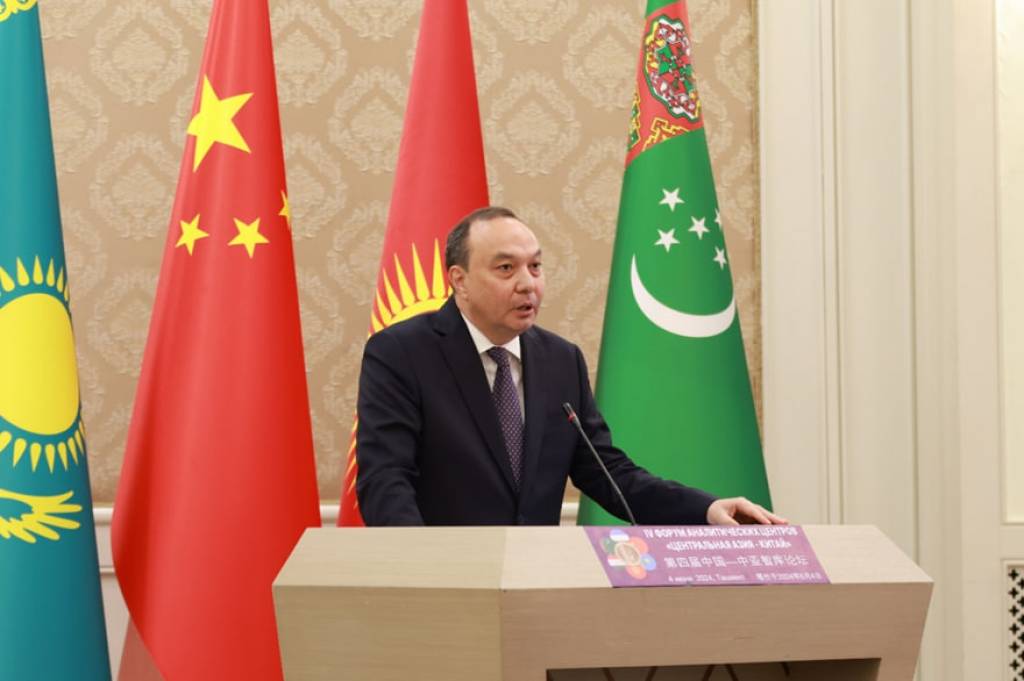ISRS Director: The economy should become the framework and driving force for mutually beneficial cooperation

In his speech at the Fourth Forum of “Central Asia—China” think tanks, which opened today on “Mutually beneficial cooperation on the path to shared prosperity and sustainable development”, the Director of the Institute for Strategic and Regional Studies (ISRS) under President, Eldor Aripov, emphasized that China’s interaction with the countries of Central Asia in recent years has shown steady dynamics of sustainable growth.
According to him, the first summit of Central Asian and Chinese leaders, held in May last year, was a clear confirmation of this. The event demonstrated a high degree of political trust and a willingness to further strengthen mutually beneficial cooperation between China and the countries of the Central Asian region.
The expert recalled that the Xi’an Declaration adopted as a result, as well as the signed documents and planned projects, determined the future contours of the development of multilateral interaction.
“As the President of Uzbekistan Shavkat Mirziyoyev rightly noted in his speech at the summit, “we have achieved mature cooperation based on trust, respect, and consideration of each other’s interests”, the ISRS head said.
“Indeed, no matter what area we take, there are impressive achievements”, E. Aripov clarified.
Thus, the volume of mutual trade turnover and investment has increased significantly. At the end of 2023, regional trade with China reached almost $90 billion (+27% year on year) – this is about a third (36%) of the total foreign trade of the Central Asian countries ($245.4 billion).
In addition, according to the institute’s head, Chinese direct investment in the regions has been steadily increasing, reaching almost $15 billion.
With Chinese partners, flagship projects have been implemented in the energy, mining, and manufacturing industries, and various industrial parks and free economic zones have been created.
Eldor Aripov noted with satisfaction that Beijing has firmly established itself as a key partner in developing transport and logistics infrastructure.
With the assistance of the People’s Republic of China, the multimodal highway “China – Kyrgyzstan – Uzbekistan” and the international center for cross-border cooperation “Khorgos” were implemented. Roads and railways were built and reconstructed, bridges and tunnels were erected.
At the same time, according to the ISRS Director, China has become one of the key destinations for the products of the region. Central Asian countries are consistently increasing the range of competitive goods supplied to the vast Chinese consumer market.
At the same time, the trade structure continues to be optimized. Trade in the format of cross-border e-commerce is rapidly developing.
As a result, Eldor Aripov explained, cooperation with China significantly contributes to the progressive development of Central Asia, promoting economic growth, strengthening connectivity, and, in general, increasing the region’s stability.
“However, this is not a reason to stop there”, he is convinced.
In his opinion, developing a long-term agenda, long-term plans, and tasks for multifaceted cooperation for decades to come is fundamentally important.
In this regard, the expert added, it is no coincidence that the President of Uzbekistan initiated an expert conference on linking the national development strategies of the Central Asian countries and China while speaking at the Xi'an summit.
“Today’s event can be considered the first step towards the practical implementation of this proposal. We have an excellent opportunity to identify new points of contact between the interests of China and the Central Asian countries, identify current areas of cooperation, and develop specific proposals to strengthen multilateral interaction significantly”, the expert said.
First, he believes, the priority task should be to implement a strategic breakthrough in the economic direction. It is extremely important to highlight cooperation in trade, investment, technology, and innovation as imperatives for our interaction. The economy must become the framework and driving force for mutually beneficial cooperation.
Summarizing the above, the ISRS Director emphasized the need for joint efforts to transform Central Asia into an essential link in interregional connectivity and the global value chain, as well as the disclosure of its production, resources, raw materials, and human capital. “This, in turn, will be the key to the stability of our region, both in the face of internal and external challenges, providing a guarantee of prosperity for the vast region of Eurasia”, Eldor Aripov concluded.






